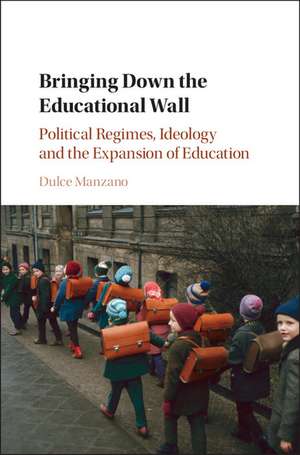Bringing Down the Educational Wall: Political Regimes, Ideology, and the Expansion of Education
Autor Dulce Manzanoen Limba Engleză Hardback – 8 iun 2017
Preț: 450.64 lei
Preț vechi: 489.83 lei
-8% Nou
Puncte Express: 676
Preț estimativ în valută:
86.23€ • 92.21$ • 71.90£
86.23€ • 92.21$ • 71.90£
Carte disponibilă
Livrare economică 28 martie-11 aprilie
Livrare express 13-19 martie pentru 47.84 lei
Preluare comenzi: 021 569.72.76
Specificații
ISBN-13: 9781107024540
ISBN-10: 1107024544
Pagini: 276
Dimensiuni: 156 x 235 x 19 mm
Greutate: 0.93 kg
Editura: Cambridge University Press
Colecția Cambridge University Press
Locul publicării:New York, United States
ISBN-10: 1107024544
Pagini: 276
Dimensiuni: 156 x 235 x 19 mm
Greutate: 0.93 kg
Editura: Cambridge University Press
Colecția Cambridge University Press
Locul publicării:New York, United States
Cuprins
1. Introduction; 2. The institutional link; 3. Tracing the impact of political regimes; 4. The ideology of dictatorships; 5. Political regimes, economic development and the expansion of education; 6. Political regimes and education policies. Case analysis; 7. The impact of inequality on education; Conclusion.
Recenzii
'Manzano sheds important new light on why some governments expand educational opportunities for their citizens while others do not, starting from a simple, yet powerful, insight: that educational programs have redistributive effects. This allows her to draw novel and compelling insights – based on rigorous statistical analysis and careful case studies – into how economic development, inequality, and political institutions shape the ultimate development of human capital. The book is a critical, timely contribution for students of development, education, and political regimes.' Michael Albertus, University of Chicago
'Human capital is a crucial source of growth. But what determines its supply and accumulation? Using freshly-gathered evidence for all sovereign countries since the early 1960s, Professor Manzano shows that, conditional on economic development, political institutions and the policy preferences of those that govern them shape the level of school enrollment. Politics does not affect the extent of national schooling in poor countries. However, as growth starts to take place, democracies and, most notably, left-wing dictatorships expand education. This terrific book, which includes many additional insights on, among other things, the effects of electoral rules, partisanship and inequality, is a must-read for those interested in the political economy of education provision, redistribution, and development.' Carles Boix, Robert Garrett Professor of Politics and Public Affairs, Princeton University
'What is the effect of political institutions on the well-being of citizens, especially their educational advancement? To answer this question, Manzano distinguishes – both theoretically and empirically – between left- and right-wing dictatorships. She convincingly shows that for much of the post-World War II period, left-wing dictatorships have done more to expand education than either their right-wing counterparts or democracies. Through rigorous theorizing and care data analysis, Manzano's work is a major contribution to both the comparative study of autocracies and the political economy of redistribution.' Jennifer Gandhi, Emory University, Atlanta
'Human capital is a crucial source of growth. But what determines its supply and accumulation? Using freshly-gathered evidence for all sovereign countries since the early 1960s, Professor Manzano shows that, conditional on economic development, political institutions and the policy preferences of those that govern them shape the level of school enrollment. Politics does not affect the extent of national schooling in poor countries. However, as growth starts to take place, democracies and, most notably, left-wing dictatorships expand education. This terrific book, which includes many additional insights on, among other things, the effects of electoral rules, partisanship and inequality, is a must-read for those interested in the political economy of education provision, redistribution, and development.' Carles Boix, Robert Garrett Professor of Politics and Public Affairs, Princeton University
'What is the effect of political institutions on the well-being of citizens, especially their educational advancement? To answer this question, Manzano distinguishes – both theoretically and empirically – between left- and right-wing dictatorships. She convincingly shows that for much of the post-World War II period, left-wing dictatorships have done more to expand education than either their right-wing counterparts or democracies. Through rigorous theorizing and care data analysis, Manzano's work is a major contribution to both the comparative study of autocracies and the political economy of redistribution.' Jennifer Gandhi, Emory University, Atlanta
Notă biografică
Descriere
The book studies how democracy and the ideology of dictatorships condition the effects of economic development and inequality on the expansion of education.
